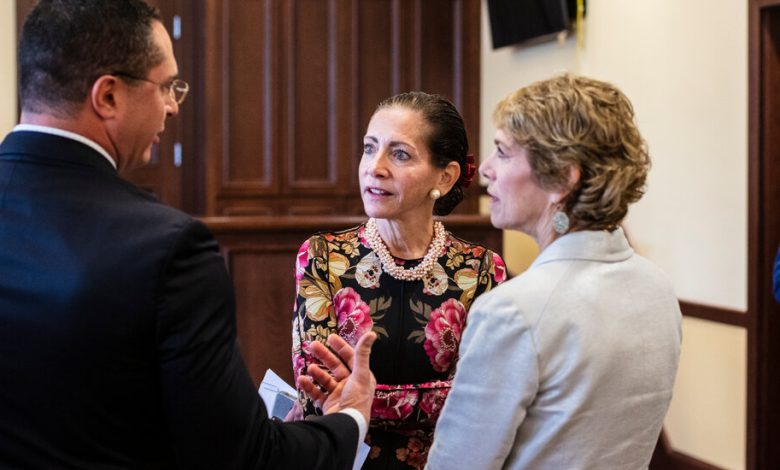A Senate Candidate Accused of Nepotism Has Another Edge: The Ballot

Tammy Murphy, the wife of New Jersey’s Democratic governor, announced she was running to unseat the state’s embattled senior senator, Robert Menendez, early on a Wednesday.
Within hours, she had notched endorsements from Democratic leaders in two counties, followed by a third the next day. That Friday, four more county leaders joined the chorus of praise.
In 72 hours, without ever hitting the campaign trail, Ms. Murphy, a first-time candidate with limited experience, had lined up backing from Democratic leaders in one-third of the state’s counties, representing 56 percent of New Jersey’s registered Democratic voters.
They had every incentive to jump aboard swiftly. The fortunes of six of those seven county leaders hinge in part on being in the governor’s good graces.
In many states, such endorsements would have limited value. But in New Jersey, county leaders hold enormous power in primary campaigns because of election rules unique to the state. In 19 of the state’s 21 counties, Democratic and Republican leaders are allowed to place their favored primary candidates on what is known as “the line” — a preferential ballot position that often means the difference between victory and defeat.
These county-endorsed candidates are bracketed with incumbents most familiar to voters in a horizontal or vertical line. Unendorsed candidates often appear off to the side — solitary names in a nearby row or at the ballot’s edge, a location commonly referred to as “ballot Siberia.”
Good-government groups have decried the decades-old practice as a relic of corrupt machine politics; others have filed a federal lawsuit hoping to overturn it.
Now, Ms. Murphy’s high-profile race in one of the bluest states in the country is seen as a test of the system itself at a moment when Democrats are trying to stake out a moral high ground on issues of democracy.
Henal Patel, the law and policy director at the New Jersey Institute for Social Justice, called the line a “sophisticated form of voter suppression” that belies the state’s “halo of progressivism.”
“We like to think, ‘Those poor voters in the South — in Alabama and in Georgia,’” she said.
“But this is how we do voter suppression in New Jersey,” she added.
Ms. Murphy is competing for the Democratic nomination against a field of candidates that includes Representative Andy Kim, a third-term Democrat from South Jersey.
Mr. Kim, 41, entered the race a day after Mr. Menendez was charged in what federal prosecutors described as an elaborate bribery scheme. He is one of the few elected leaders in New Jersey who has called for nullifying the line, yet he has acknowledged that he will nonetheless vie for the line in every county as he runs for Senate. (He has run on the line in all of his House primary races.)
Ms. Murphy, 58, who worked as a financial analyst before she and Gov. Philip D. Murphy married and has since volunteered on nonprofit and philanthropic boards, has been battered by questions about nepotism from the start. If elected in November, she and the governor, a second-term Democrat, would hold two of New Jersey’s four statewide elected offices.
Even Mr. Menendez, who has pleaded not guilty to accepting bribes and has not ruled out running for re-election, criticized her entry in the race. “They believe they have to answer to nobody,” he said of the Murphys.
The governor, who declined to comment for this article, citing the lawsuit challenging the county-line system, last week suggested that any backlash Ms. Murphy was facing was sexist. “I think they’re holding it against her that she’s my wife,” he said during a call-in radio show on WNYC. “I bet you if she were my husband it would be a different story.”
“She has overwhelming support,” he added, “and she’s earned it.”
Still, six of the seven county leaders who endorsed Ms. Murphy within three days of her entry in the race also have financial incentives to please the governor, who controls a budget that last year exceeded $54 billion and who has final say on all legislation.
Two are lobbyists with millions of dollars in business before the state. Two hold generous taxpayer-funded jobs. One runs a law firm with clients hoping to do business with the state. Another sits on the board of a hospital that receives millions of dollars in state grants.
Alex Altman, a spokeswoman for the Murphy campaign, said in a statement that the first lady was working within the system that exists, “like every candidate this cycle.” The early endorsements were the result of “deep relationships she has built” and “her record of building up the Democratic Party in New Jersey and beyond,” Ms. Altman said.
Final decisions about who will be awarded each county’s line for the June 4 primary have not been made, and it remains a matter of open debate in many counties. But there is no doubt that the candidate who wins the most county lines will have an extraordinary advantage.
No New Jersey legislative incumbent chosen to run on the county line in all of the counties he or she represented has lost a primary election since 2009, according to a recent study by a Rutgers University professor, Julia Sass Rubin. By comparison, in the other 49 states, 1,145 legislative incumbents lost primary elections during that same time period. Candidates for Congress had an advantage of 38 percentage points, the study found.
Sam Wang, a professor of neuroscience at Princeton University who leads the school’s Gerrymandering Project, called the line the “special New Jersey sauce” that “guides the eye.”
“We like lines of objects in a row,” Professor Wang said about its potency. Voters are drawn to the candidates whose names appear on the line — and may overlook the others, he said.
The county line system is not without defenders.
Micah Rasmussen, director of the Rebovich Institute for New Jersey Politics at Rider University, said he believed the county line could be a useful tool for screening candidates and preserving party identity. “It’s sort of like a board of directors making a recommendation to shareholders,” Professor Rasmussen said. “It’s up to voters to ratify or not ratify the recommendations.”
The contours of Ms. Murphy’s primary have created an extraordinary situation for the Democratic county chairs.
LeRoy J. Jones Jr. is the chairman in Essex County, which includes Newark and has more Democratic voters than any other county in the state, and the chairman of the state Democratic Party; he is also a registered lobbyist with 1868 Public Affairs. Since 2018, when Mr. Murphy was sworn in, Mr. Jones has made roughly $1.5 million in lobbying fees, according to state lobbying records, including $378,000 in 2022.
Mr. Jones said he offered an early endorsement because he had worked well with Ms. Murphy during the governor’s two terms and believed she would be a successful senator. He said he had never felt pressured to support her in order to preserve his standing with the governor.
Kevin P. McCabe, chairman of the Middlesex County Democratic Organization, which is among the most influential in the state, is also a partner at a lobbying firm, River Crossing Strategy Group. River Crossing disclosed just under $2 million in fees in 2022. One client, Equinor, is an energy company specializing in wind turbines. The Murphy administration is currently searching for a new vendor for a multibillion-dollar wind farm planned for the Jersey Shore.
Mr. McCabe was also nominated by Mr. Murphy to the board of the Port Authority of New York and New Jersey, an unpaid position that is considered one of the most powerful political perches in the New York region, overseeing a $9 billion budget. (He was first nominated by former Gov. Chris Christie in 2018 and renominated by Mr. Murphy in 2021.)
Mr. McCabe had no comment about his endorsement of Ms. Murphy.
Paul A. Juliano, the Democratic chairman of Bergen County, the most populous region of the state, endorsed Ms. Murphy the same day as Mr. McCabe and Mr. Jones. In March, the governor nominated Mr. Juliano to be chief executive of the New Jersey Sports and Exposition Authority, a state job with a salary of $280,000. Mr. Juliano declined to comment on his endorsement.
Other supporters have financial ties to municipal or county governments, which derive both money and direction from state leaders.
John Currie, the Passaic County Democratic chairman, was hired by the Passaic County Board of Social Services for a part-time consulting job focused on welfare benefits in April 2018. The job pays $92,000 a year. (Mr. Currie said that his job with Passaic County has nothing to do with the state, and that he endorsed Ms. Murphy because “she helped me a lot” when he was state chairman and the two are friends.)
Peg Schaffer, Somerset County’s Democratic chairwoman, runs a law firm regularly hired by local governments. Her biography on the firm’s website also states that she “represents a number of out-of-state entities anxious to do business in New Jersey.”
Ms. Schaffer, who is also the vice chairwoman of the New Jersey Democratic State Committee, said her endorsement of Ms. Murphy was based “wholly on who she is.”
“She’s a voice that’s not being heard down there,” Ms. Schaffer said about Congress.
George E. Norcross III, a powerful insurance executive, is not a county chairman but still holds enormous sway over Camden County Democrats and others in South Jersey. He is the chairman of the board of trustees of Cooper Health System and Cooper University Hospital, which received more than $50 million in grants this year from the state.
Camden County’s Democratic chairman also endorsed Ms. Murphy the day after she entered the race. Mr. Norcross declined to comment on the endorsement.
Even if Ms. Murphy wins the right to run on the line in most counties, voters will have the final say. And there are early signs that progressive groups that sprang up in the wake of the 2016 election, as Democrats organized to blunt former President Donald J. Trump’s power in Congress, are mobilizing in favor of Mr. Kim. This, combined with the high-profile nature of the race for Mr. Menendez’s seat, and the renewed media scrutiny of the county line itself, has left opponents feeling hopeful that the state could be on the brink of change.
“If there’s a recipe for it to topple,” Ms. Patel said, “it’s now.”
Kitty Bennett contributed research.



